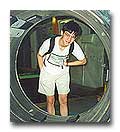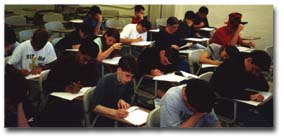

About the Program
The U.S. Physics
Team will fulfill its mission by achieving the following goals:
We have been consistently
successful in achieving this goal. Team members have won more than 46 medals
in the fifteen years we have participated in the IPhO.
The USA Team was very successful last year in the 31st International Olympiad,
held in Anyalya, Turkey:
Another way is to
see what immediate impact the program has had on the lives that were touched
by it.
History
In 1986 under the
direction of the AAPT Executive Officer, Jack Wilson, AAPT organized for
the first time the United States Physics Team. The team was made up of
20 talented high school physics students who had been nominated by their
teachers. Following a rigorous and intense program in the physics department
of the University of Maryland, five students were selected to represent
the U.S. Team in London. The United States team brought home three Bronze
Medals--the most medals any team had ever won in their first competition.
Since that time, the United States team has consistently ranked near the
top ten of all nations.
Selection
Process  Mission
Mission
The mission of the U.S. Physics Team Program is to promote and demonstrate academic
excellence through preparation for and participation in the International
Physics Olympiad.
Measures of Success
 There are many ways to measure success. One way is to look at the medals we won
and how well our team performs at the International Physics Olympiad.
There are many ways to measure success. One way is to look at the medals we won
and how well our team performs at the International Physics Olympiad.
 In
an anonymous survey answered by the Team after their summer camp,
one student stated: "I enjoyed being with all these smart people who think
the way I do." Others commented on "solving interesting problems with
interesting people," and "meeting new people with similar interests and
spending time with them playing games and talking."
In
an anonymous survey answered by the Team after their summer camp,
one student stated: "I enjoyed being with all these smart people who think
the way I do." Others commented on "solving interesting problems with
interesting people," and "meeting new people with similar interests and
spending time with them playing games and talking."
The Physics Olympiads
began in 1967 with the first competition in Warsaw, Poland. Initially
only Eastern European nations competed, but in the early 1980's western
countries began to participate, first through Germany then the U.K., U.S.A.
and Canada. The IPhOs now attract teams from all over the globe.
The selection process
begins in early January of each year when high school teachers nominate
their best students - usually about 1100 highly qualified students are
eligible to take a national exam. The 200 top scorers on this test then
advance to the next round of competition. Results from second round of
testing are used to select the final 24 members of the U.S. Physics Team.
 These
24 students attend a training camp where they will engage in eight days of intense studying, testing and
problem solving. At the end of that training camp, five students will
be selected for the "Traveling Team." The Traveling Team will return for an extra 3 days of intense work in the laboratory before
they are ready for the International Event.
These
24 students attend a training camp where they will engage in eight days of intense studying, testing and
problem solving. At the end of that training camp, five students will
be selected for the "Traveling Team." The Traveling Team will return for an extra 3 days of intense work in the laboratory before
they are ready for the International Event.
 The
training camp experience is immensely valuable for the participants. The
instruction provides an introduction to university style teaching and
equipment. Students become familiar with aspects of first year university
curricula in physics which in turn accelerates their studies during their
remaining time in high school.
The
training camp experience is immensely valuable for the participants. The
instruction provides an introduction to university style teaching and
equipment. Students become familiar with aspects of first year university
curricula in physics which in turn accelerates their studies during their
remaining time in high school.
About the Program